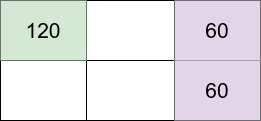g1601_1700.s1659_maximize_grid_happiness.readme.md Maven / Gradle / Ivy
Go to download
Show more of this group Show more artifacts with this name
Show all versions of leetcode-in-kotlin Show documentation
Show all versions of leetcode-in-kotlin Show documentation
Kotlin-based LeetCode algorithm problem solutions, regularly updated
1659\. Maximize Grid Happiness
Hard
You are given four integers, `m`, `n`, `introvertsCount`, and `extrovertsCount`. You have an `m x n` grid, and there are two types of people: introverts and extroverts. There are `introvertsCount` introverts and `extrovertsCount` extroverts.
You should decide how many people you want to live in the grid and assign each of them one grid cell. Note that you **do not** have to have all the people living in the grid.
The **happiness** of each person is calculated as follows:
* Introverts **start** with `120` happiness and **lose** `30` happiness for each neighbor (introvert or extrovert).
* Extroverts **start** with `40` happiness and **gain** `20` happiness for each neighbor (introvert or extrovert).
Neighbors live in the directly adjacent cells north, east, south, and west of a person's cell.
The **grid happiness** is the **sum** of each person's happiness. Return _the **maximum possible grid happiness**._
**Example 1:**

**Input:** m = 2, n = 3, introvertsCount = 1, extrovertsCount = 2
**Output:** 240
**Explanation:** Assume the grid is 1-indexed with coordinates (row, column).
We can put the introvert in cell (1,1) and put the extroverts in cells (1,3) and (2,3).
- Introvert at (1,1) happiness: 120 (starting happiness) - (0 \* 30) (0 neighbors) = 120
- Extrovert at (1,3) happiness: 40 (starting happiness) + (1 \* 20) (1 neighbor) = 60
- Extrovert at (2,3) happiness: 40 (starting happiness) + (1 \* 20) (1 neighbor) = 60
The grid happiness is 120 + 60 + 60 = 240.
The above figure shows the grid in this example with each person's happiness. The introvert stays in the light green cell while the extroverts live on the light purple cells.
**Example 2:**
**Input:** m = 3, n = 1, introvertsCount = 2, extrovertsCount = 1
**Output:** 260
**Explanation:** Place the two introverts in (1,1) and (3,1) and the extrovert at (2,1).
- Introvert at (1,1) happiness: 120 (starting happiness) - (1 \* 30) (1 neighbor) = 90
- Extrovert at (2,1) happiness: 40 (starting happiness) + (2 \* 20) (2 neighbors) = 80
- Introvert at (3,1) happiness: 120 (starting happiness) - (1 \* 30) (1 neighbor) = 90
The grid happiness is 90 + 80 + 90 = 260.
**Example 3:**
**Input:** m = 2, n = 2, introvertsCount = 4, extrovertsCount = 0
**Output:** 240
**Constraints:**
* `1 <= m, n <= 5`
* `0 <= introvertsCount, extrovertsCount <= min(m * n, 6)`